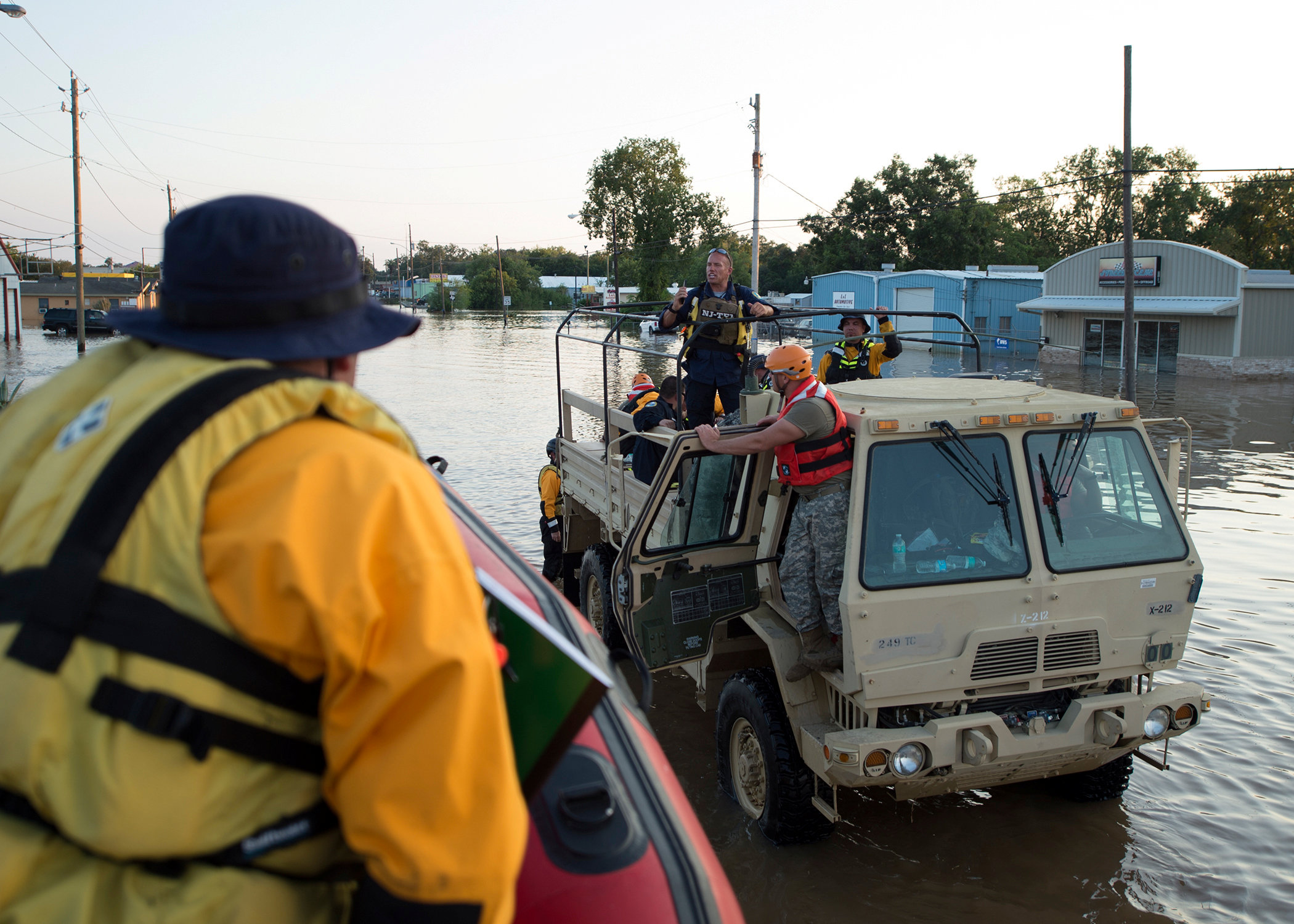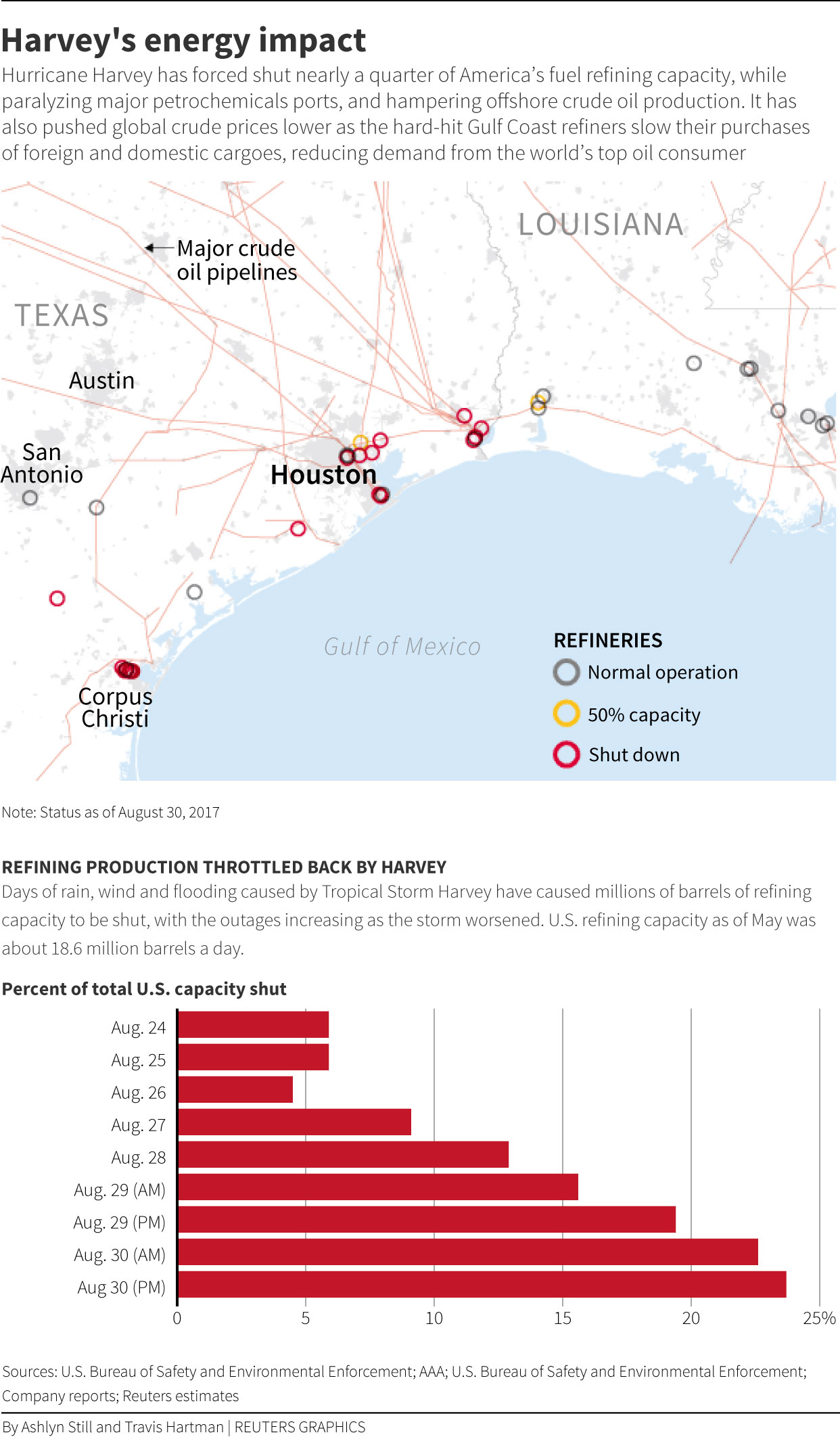By Emily Flitter and Daniel Trotta
HOUSTON (Reuters) – U.s. President Donald Trump travels to Houston and Lake Charles, Louisiana on Saturday to meet victims of catastrophic storm Harvey, one of the worst natural disasters in U.S. history that is presenting a test of his administration.
While Trump visits, attention will also be focused on Minute Maid Park, where baseball’s Houston Astros play their first home games since Harvey devastated the fourth-most populous U.S. city. The Saturday doubleheader with the New York Mets is expected to be wrought with emotion and punctuated with moments to honor the dozens who died as a result of Harvey.
The storm, one of the costliest to hit the United States, has displaced more than 1 million people, with 50 feared dead from flooding that paralyzed Houston, swelled river levels to record highs and knocked out the drinking water supply in Beaumont, Texas, a city of 120,000 people.
Hurricane Harvey came ashore last Friday as the strongest storm to hit Texas in more than 50 years. Much of the damage took place in the Houston metropolitan area, which has an economy about the same size as Argentina’s.
For graphic on hurricane costs, click http://tmsnrt.rs/2vGkbHS
For graphic on storms in the North Atlantic, click http://tmsnrt.rs/2gcckz5
Seventy percent of Harris County, which encompasses Houston, at one point was covered with 18 inches (45 cm) or more of water, county officials said.
Trump first visited the Gulf region on Tuesday, but stayed clear of the disaster zone, saying he did not want to hamper rescue efforts. Instead, he met with state and local leaders, and first responders.
He was criticized, however, for not meeting with victims of the worst storm to hit Texas in 50 years, and for largely focusing on the logistics of the government response rather than the suffering of residents.
The White House said Trump will first travel to Houston to meet with flood survivors and volunteers who assisted in relief efforts and then move on to Lake Charles, another area hammered by the storm.
The Trump administration in a letter to Congress asked for a $7.85 billion appropriation for response and initial recovery efforts. White House homeland security adviser Tom Bossert has said aid funding requests would come in stages as more became known about the impact of the storm.
Texas Governor Greg Abbott has said that his state may need more than $125 billion.
The storm, which lingered around the Gulf of Mexico Coast for days, dumped record amounts of rain and left devastation across more than 300 miles (480 km) of the state’s coast.
As water receded, many returned to survey the damage and left hundreds of thousands wondering how they can recover.
In Orange, Texas, about 125 miles (200 kms) east of Houston, Sam Dougharty, 36, returned on Friday where waist-high water remained in his backyard and barn.
His family’s house smelled like raw sewage and was still flooded to the ankles. A calf and a heifer from their herd of 15 were dead. The chickens were sagging on the top two roosts of their coop.
“We never had water here. This is family land. My aunt’s owned it for 40 years and never had water here,” he said.

Members of Army National Guard conduct high water rescue operations in the aftermath of Tropical Storm Harvey in Wharton, Texas, U.S. in this August 31, 2017 handout photo. Senior Master Sgt. Robert Shelley/Air National Guard/Handout via REUTERS
FROM THE SHELTER TO THE STADIUM
Harvey came on the 12th anniversary of Hurricane Katrina, which killed about 1,800 around New Orleans. Then-U.S. President George W. Bush’s administration was roundly criticized for its botched early response to the storm.
Some of the tens of thousands of people forced into shelters by Harvey will attend the Astros game where Houston Mayor Sylvester Turner will throw out the first pitch and a moment of silence in planned for those who perished.
Sports have helped other cities rebound from catastrophe, such as when the New York Mets played the first baseball game in their damaged city 10 days after the attacks of Sept. 11, 2001, or when the New Orleans Saints returned to the Superdome in 2006 for football a year after Hurricane Katrina.
In the Harris County area of Clear Creek, the nearly 50 inches (127 cm) of rain that fell there equated to a once in a 40,000 year event, Jeff Lindner, meteorologist with the Harris County Flood Control District, said.
Some 440,000 Texans have already applied for federal financial disaster assistance, and some $79 million has been approved so far, Abbott said.
The storm shut about a fourth of U.S. refinery capacity, much of which is clustered along the Gulf Coast, and caused gasoline prices to spike to a two-year high ahead of the long Labor Day holiday weekend.
The national average for a gallon of regular gasoline has risen more than 17.5 cents since the storm struck, hitting $2.59 as of Saturday morning, motorists group AAA said.
Meanwhile a new storm, Irma, had strengthened on Friday into a Category 3 hurricane on the five-step Saffir-Simpson scale. It remained hundreds of miles from land but was forecast to possibly hit Puerto Rico, the Dominican Republic and Haiti by the middle of next week.
(Additional reporting by Richard Valdmanis, Ernest Scheyder, Ruthy Munoz, Peter Henderson and Andy Sullivan in Houston, Steve Holland in Washington, Julia Simon in New York, Jon Herskovitz in Austin, Texas, and Brendan O’Brien in Milwaukee; Writing by Jon Herskovitz and Dan Whitcomb; Editing by Jacqueline Wong)
 The Sam Houston Parkway is still completely covered with Harvey floodwaters in Houston, Texas September 1, 2017. REUTERS/Rick Wilking
The Sam Houston Parkway is still completely covered with Harvey floodwaters in Houston, Texas September 1, 2017. REUTERS/Rick Wilking

